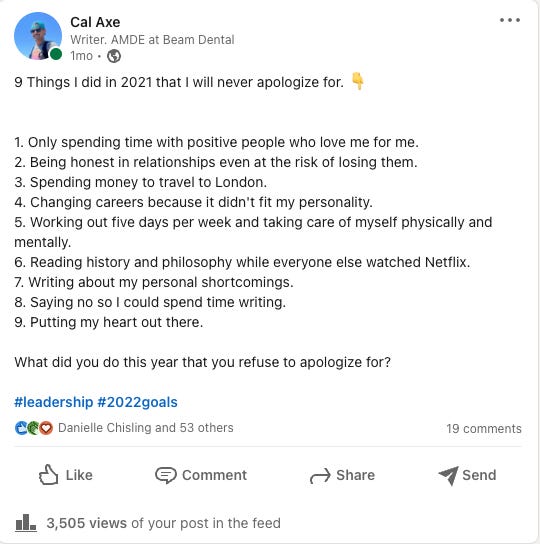LinkedIn Doesn't Want Great Writers, Just Post 100 Honest Words and Go Viral
The last piece of advice in this article could change your life
LinkedIn Doesn't Want Great Writers, Just Post 100 Honest Words and Go Viral

I was an obsessed little hermit when started writing online.
I tracked down famous writers and noted their habits and strategies, shelled out hard-earned cash for online writing workshops, and wrote down word-for-word cool paragraphs written by Tim Denning and Ryan Holiday.
I even personally got to know Tom Kuegler, who I now consider a mentor.
Here's a piece of top-secret, insider trading about these great writers:
They've all cut back their content on Medium and personal blogs and shifted their attention to a platform you know well— LinkedIn.
Their logic?
- LinkedIn is one of the fastest-growing social media platforms.
- 90% of its users don't post anything of value or substance.
- An honest, 100-word post can go viral.
More engagement. Less work. Style is not necessary.
Medium is fantastic, but the algorithm wants 1,200-word articles and only generates views when a publisher picks them up. I'll work for hours, wait days to get published, and because it's writing and nothing is guaranteed, the article might get 100 views. No joke.
Instagram is making room for writers, but they’ll always value beautiful images over compelling words. Unless you have a mug like Timothee Chamalet, your words won't get eyeballs.
LinkedIn is the place to be if you want to write.
Why you should write on LinkedIn even if you’re not a writer.
There’s no downside.
If you’re a business professional and not posting on LinkedIn, you’re missing out on a massive opportunity. It’s one of those things you’re going to regret when you’re 50 years old.
The platform is an opportunity to elevate your personal brand so you can win new business. When I was in commercial real estate, I became known as the LinkedIn guy. That same year, I won Rookie of The Year and Broker of The Year at my firm. All I did was post three times per week.
Most employers use LinkedIn to research new candidates. Your influence makes their job easy.
Your thoughts could become so popular that you never have to work for a boss ever again. You could start your own business.
Why writing is the f*cking best
I popped in the art museum this weekend. I wanted to admire a piece by my favorite impressionist painter Monet – the Columbus Museum of Art has an original called Weeping Willow.
It's an eerie yet captivating portrait of a willow tree completed at the height of WWI. The tree appears in pain and bleeding, reflecting the tragedy that engulfed Europe. From Monet's POV, the Germans were closing in on France. He could hear artillery fire from his residence in Giverny. What's worse, his only surviving son was sent to the front lines.
That's the miracle of painting, writing, music, entrepreneurship, and business.
We have the opportunity to take a setback and transform that bleeding willow tree into a lesson for others to learn from and enjoy.
That's what we all really want right? Not to survive life's experiences but turn them into something beautiful.
Writers do that EVERY SINGLE DAY.
Do you have a story about a setback and the lessons learned? Can you tell it in 500 words? 300 words? How about 100 words?
I bet you could.
Copy this writing routine
Here's my LinkedIn writing routine. From what I can tell, most online writers follow a similar pattern.
Wake up early: I wake up at 4:30 am in a disgusting attempt to emulate the Navy Seal/writer Jocko Willink. I don't recommend it. The idea is to write when you're least likely to get distracted. Ben Hardy wrote in his car at 5 am when he was kickstarting his writing career. It was the only place where his kids couldn't distract him.
Read 1-hour each morning: You can be a great reader and not write, but you can't write without being a great reader. Block off at least 1 hour to read and fill your head with ideas.
Write 10 tips, ideas, lessons, or headlines: Ten ideas usually lands at least one idea that sets your soul on fire. Use LinkedIn mission statement as a guide when coming up with ideas: “Connect the world's professionals to make them more productive and successful.”
Outline: Go for a walk or sit there and think of at least three arguments, statistics, or anecdotes supporting your idea. You only need one argument if you’re going for 200 words.
Write in your natural voice.
Edit using at least two grammar/spell checker apps. I use Grammarly and prowritingaid.
Hit post, and don't overthink it. As the basketball player JR Smith once said, "When in doubt, let it fly."
(Here’s another example from me)
Hands down the best way to get started writing on LinkedIn
Make writing on LinkedIn a daily habit – even if it's 100 words.
James Clear, the author of Atomic Habits, said new rituals should only take 2 minutes. "You're working on showing up," he writes. "The more you ritualize the beginning of a process, the more likely it becomes that you can slip into the deep focus that is required to do great things."
Habits are hard to form on your own. They take planning and an exhaustive amount of willpower. However, there is a psychological loophole to procrastination:
Join a group of spartan warriors embarking on the same mission as you.
I joined Tom Kueglers's 30 Day LinkedIn Spring Challenge. The premise is simple. Tom brings together 40 or so writers to post on LinkedIn every single day for 30 days.
I can't recommend the program enough, especially if you're new to content creation. It could honestly change your life.
Not only will you develop an effective writing habit, but you will join a community of ambitious creators who will support your work forever.
Alright, let's see what you got!




